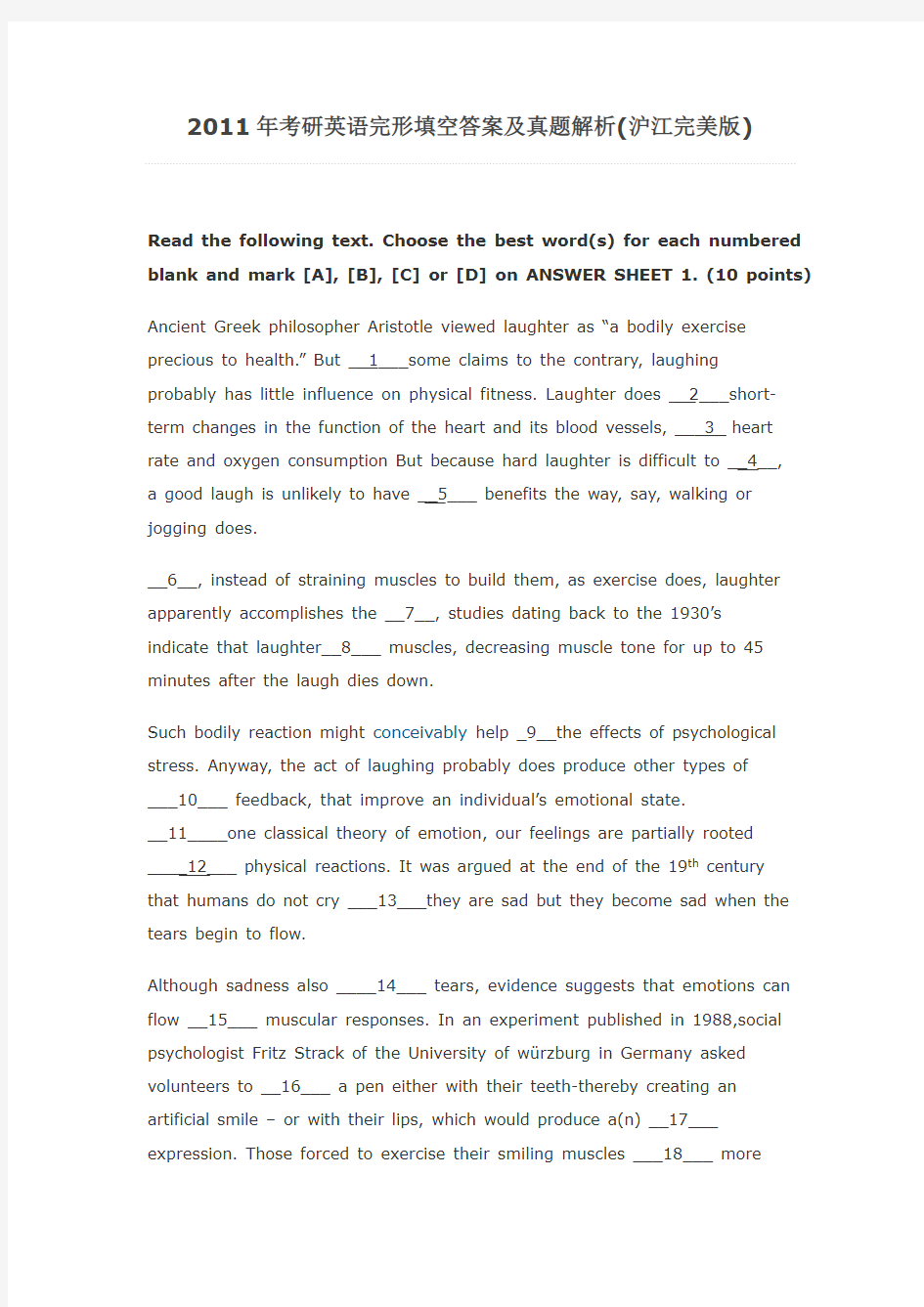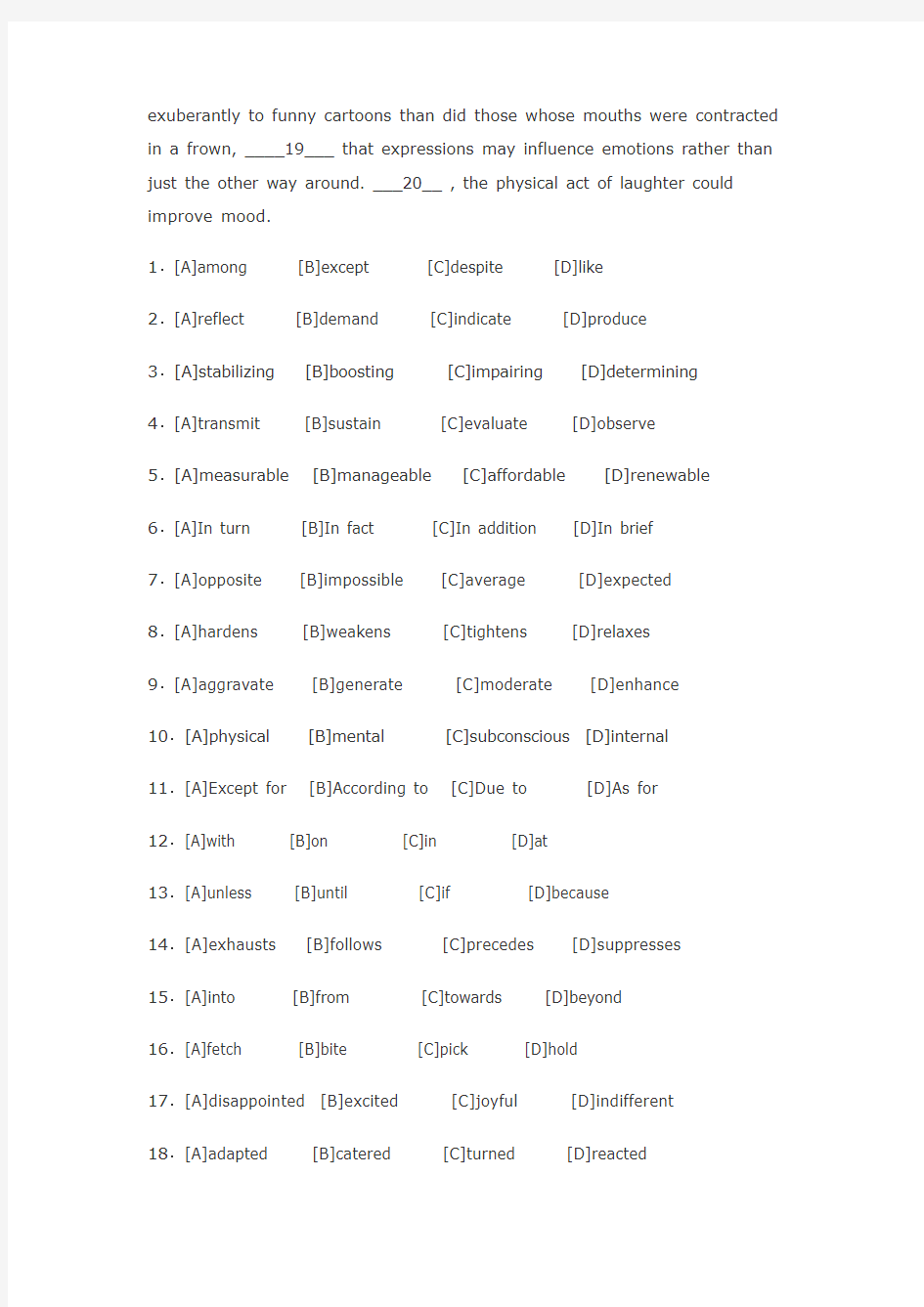2016年考研英语完形填空答案及真题解析-推荐下载


2011年考研英语完形填空答案及真题解析(沪江完美版)
Read the following text. Choose the best word(s) for each numbered blank and mark [A], [B], [C] or [D] on ANSWER SHEET 1. (10 points)
Ancient Greek philosopher Aristotle viewed laughter as “a bodily exercise precious to health.” But __1___some claims to the contrary, laughing probably has little influence on physical fitness. Laughter does __2___short-term changes in the function of the heart and its blood vessels, ___3_ heart rate and oxygen consumption But because hard laughter is difficult to __4__, a good laugh is unlikely to have __5___ benefits the way, say, walking or jogging does.
__6__, instead of straining muscles to build them, as exercise does, laughter apparently accomplishes the __7__, studies dating back to the 1930’s indicate that laughter__8___ muscles, decreasing muscle tone for up to 45 minutes after the laugh dies down.
Such bodily reaction might conceivably help _9__the effects of psychological stress. Anyway, the act of laughing probably does produce other types of
___10___ feedback, that improve an individual’s emotional state.
__11____one classical theory of emotion, our feelings are partially rooted
____12___ physical reactions. It was argued at the end of the 19th century that humans do not cry ___13___they are sad but they become sad when the tears begin to flow.
Although sadness also ____14___ tears, evidence suggests that emotions can flow __15___ muscular responses. In an experiment published in 1988,social psychologist Fritz Strack of the University of würzburg in Germany asked volunteers to __16___ a pen either with their teeth-thereby creating an artificial smile – or with their lips, which would produce a(n) __17___ expression. Those forced to exercise their smiling muscles ___18___ more
exuberantly to funny cartoons than did those whose mouths were contracted in a frown, ____19___ that expressions may influence emotions rather than just the other way around. ___20__ , the physical act of laughter could improve mood.
1.[A]among [B]except [C]despite [D]like
2.[A]reflect [B]demand [C]indicate [D]produce
3.[A]stabilizing [B]boosting [C]impairing [D]determining
4.[A]transmit [B]sustain [C]evaluate [D]observe
5.[A]measurable [B]manageable [C]affordable [D]renewable
6.[A]In turn [B]In fact [C]In addition [D]In brief
7.[A]opposite [B]impossible [C]average [D]expected
8.[A]hardens [B]weakens [C]tightens [D]relaxes
9.[A]aggravate [B]generate [C]moderate [D]enhance
10.[A]physical [B]mental [C]subconscious [D]internal
11.[A]Except for [B]According to [C]Due to [D]As for
12.[A]with [B]on [C]in [D]at
13.[A]unless [B]until [C]if [D]because
14.[A]exhausts [B]follows [C]precedes [D]suppresses
15.[A]into [B]from [C]towards [D]beyond
16.[A]fetch [B]bite [C]pick [D]hold
17.[A]disappointed [B]excited [C]joyful [D]indifferent
18.[A]adapted [B]catered [C]turned [D]reacted
19.[A]suggesting [B]requiring [C]mentioning [D]supposing
20.[A]Eventually [B]Consequently [C]Similarly [D]Conversely
【标准答案】
1.[C]despite 从后面一个句子中的little我们可以判断出这里的转折意为,因而本题
选择despite;
2.[D]produce 此处前一个词does表示强调,根据上下文课意思可判断选项;
3.[B]boosting boost意思是促进增进、stabilize意思是稳定、impair是减少削弱、determine意思是决定。因而可以判断选boost;
4.[B]sustain 本题全凭词义选择:transmit意思是传输;sustain,维持;evaluate,评估;observe,观察。
5.[A]measurable 本题一样是词义考察:measurable,可评估的;manageable,可掌握的;affordable,可承受的;renewable,可更新的。
6.[B]In fact 从后一句中的Instead of doing...可以看出此处有意群的转换,因而选择了"In fact",实际上……起到承前启后的作用。
7.[A]opposite 从前一句的instead of 得知此处句意发生转折,因而选择opposite
8.[D]relaxes 从后一句"decreasing muscle tone",减少肌肉张力,可判断此处应选择relaxes,放松。
9.[C]moderate 也是从上一句的句意“放松肌肉、减少肌肉张力”可看出此处的意思应该相同,因而选择"moderate",稳定、减轻。
10.[A]physical 还是词义考察,同学们可以从这道题看出出题老师对形近字、意近字
有多爱了吧…… physical,身体上的;mental,精神上的(这是一对,一定要记住!);subconscious,潜意识的;internal,内在的。
小编分享一个做题的“非官方方法”给大家:当选项中出现明显的成对、或反义词时,那么答案多半在其中。也就是我们可以从做一个四选一的题,变成做二选一的题。那就算是猜、正确率也有50%了吧!?
11.[B]According to 后一句提到"one classical theory of emotion",一个经典情感理论,说明是距离。所以此处连接词选择"According to"。
12.[C]in 这题的考点是介词和动词的搭配,如果你明白前一个root是“根、扎根”的意思,那么基本可以排除选项中的with,那到底是on, at 或是in,就看日常积累了。
13.[D]because 这整句的意思是:“在19世纪末期有这样的争论:人们不是因为悲伤而哭泣,而是因为当流泪时会变得悲伤。” 因而此处选择表示因果关系的because。其他的until,直到;unless,除非;if,如果,都不符合。
14.[C]precedes 词义又来:exhaust,精疲力尽;follow,跟随;precede,在……之前;suppress,抑制。
15.[B]from 从动词flow,流动,来判断。
16.[D]hold 因为后一句提到“thereby creating an artificial smile”,从而创造一个虚假的笑脸。可以看出,无论是fetch或是pick(都是取来、捡来的意思)都是不对的,bite(咬)更不对。要维持一个笑脸,所以用"hold"。
17.[A]disappointed 这道题的技巧在于,无论是excited, joyful 或是indifferent,它们所能传达的面部表情都是类似的,因而得知选disappointed,失望的——得出不一
样的表情。
18.[D]reacted 词义题:adapt,适应;cater,迎合;turn,转变;react,反应、
19.[A]suggesting 词义题:suggest,传达了、证明了;require,要求;mention,提到;suppose,假设。
这里整句话的意思是:面对搞笑卡通,那些被要求做笑脸的人比起那些被要求皱眉的人表现得更有生气。从而证明了不单单是情绪影响表情、表情也可以影响情绪。
20.[C]Similarly 从上一句的翻译大家可以看出,"the physical act of laughter could improve mood."(笑这个生理动作可以改善情绪),这个意思是和上一句一样的。所以应该选择similar,相同的。而不是其他三个选项。
